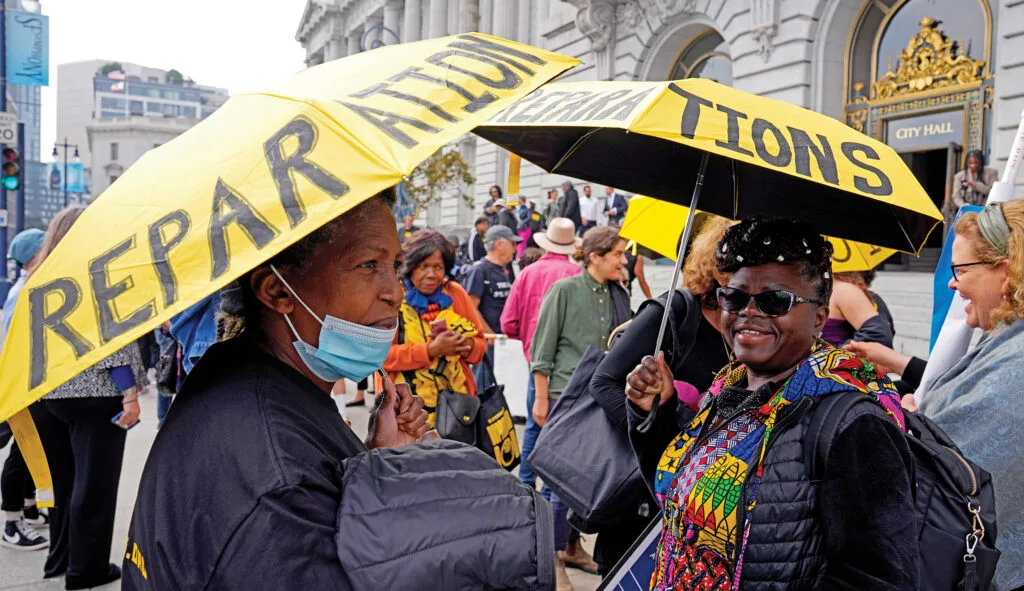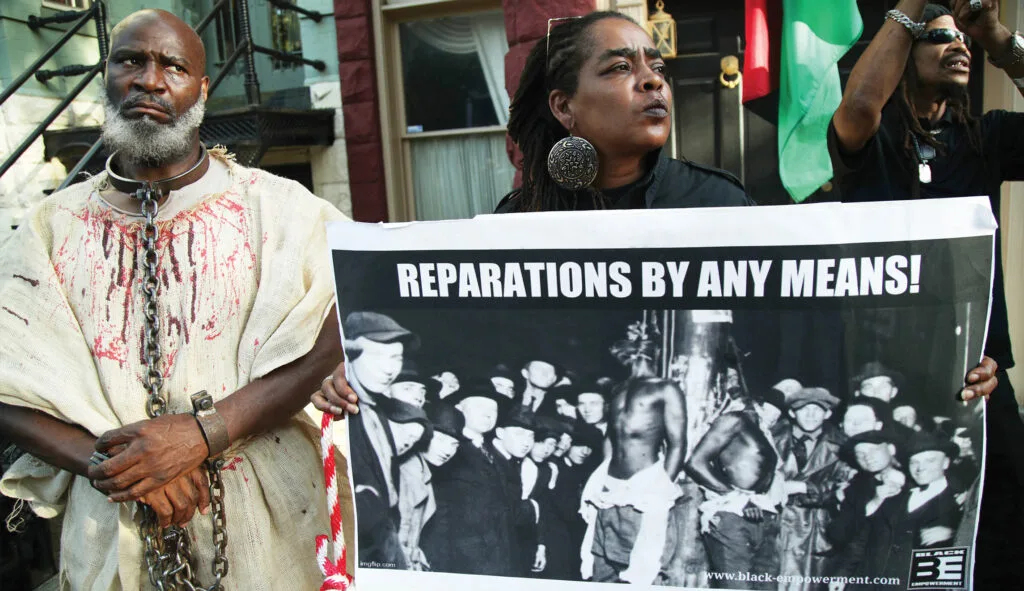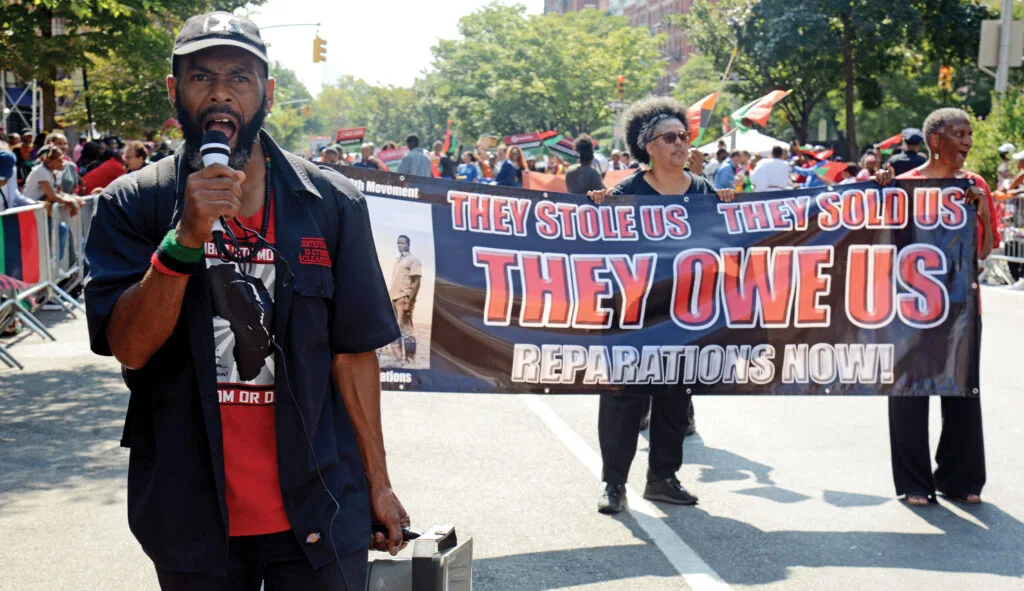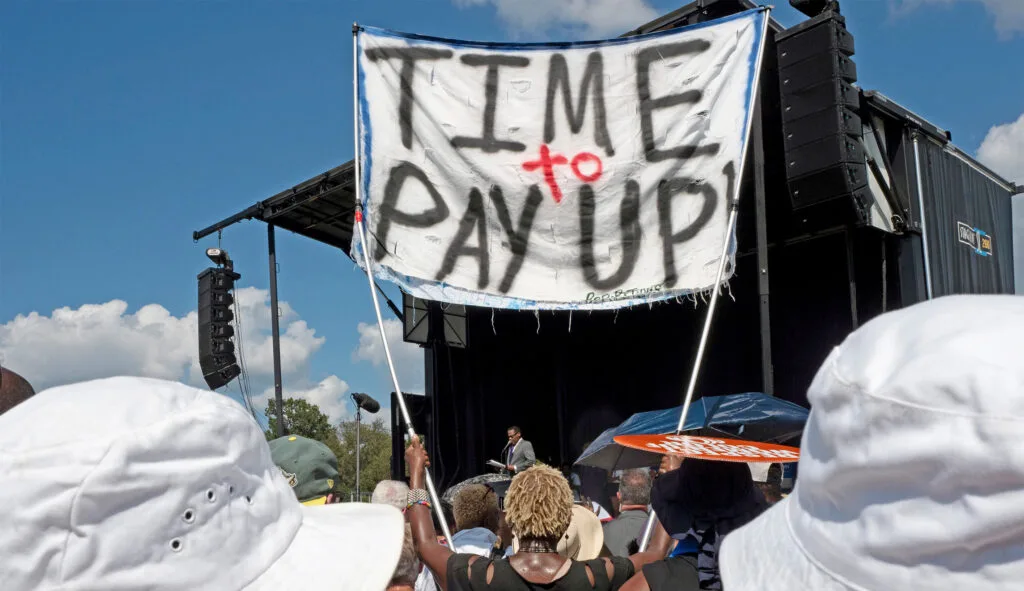I owe you nothing. Not a penny. Not for the sins of slavery or white supremacy or “structural racism” or Jim Crow or redlining or police brutality. Certainly not for the existence of racism, real or imagined.
The idea of reimbursing contemporary black citizens for the sin of slavery is one of the most corrosive, immoral, impractical, unjust, and un-American policy ideas gaining popularity on the Left. There are a slew of reasons why we shouldn’t entertain reparations. It would needlessly perpetuate racial divisions. It costs lots of money but, in the end, fixes none of the underlying problems that plague minorities.
Mostly, though, we should reject the notion because it compels us to make a false confession about our nation.
A few years ago, Ta-Nehisi Coates created a minor sensation with an impassioned Atlantic piece headlined, “The case for reparations.” “Two hundred fifty years of slavery,” he argued. “Ninety years of Jim Crow. Sixty years of separate but equal. Thirty-five years of racist housing policy. Until we reckon with our compounding moral debts, America will never be whole.”

For those, like Coates, who see every cultural and political event through the prism of race, an unfortunate affliction that riddles far too much of modern discourse, this probably makes plenty of emotional sense. But as a matter of history and ethics, it makes no sense. What debt does a, say, Scotch-Irish man living in generational poverty in Appalachia owe a millionaire like Coates, who spends his time finding himself in Paris? Unless he is preternaturally elderly, this person has nothing to do with the litany of historical wrongs laid out by Coates.
Then again, the wealthiest WASP doesn’t owe Coates anything, either. Even the descendants of the slaves or their masters should not be on the hook for either the transgressions or victimhood of their ancestors. The reparations agenda foists transgressions on those who have committed none and creates martyrs of those who have never been mistreated a day of their lives.
Your race is an immutable characteristic, not a state of mind or a set of ideas or a denomination or even a political faction. One should not be liable for the sins or praise of “white” or “black” people. The media can capitalize the latter race all day long, but it still won’t magically make skin color a distinct ethnicity.

For another thing — and I realize it’s heresy to make statements of this sort today — Coates is lucky to have been born in a nation built on foundations of Christian and classical liberal values. No one is suffering for having been bequeathed the inheritance of American constitutional order, no matter how battered those traditions were or may be today.
Indeed, today, the United States, despite its numerous difficulties and inequities, is the least racist place on Earth. No nation fits or has ever fit as many colors, creeds, and faiths within its borders without war and atrocity. Yes, there are bigots among us. There will always be bigots among us. Yes, there are economic disparities. We can debate why those gaps exist. But the promise of America is one of liberty, not slavery. On that front, all debts are paid.
How seriously should we take the idea of reparations? For now, it remains largely unpopular with voters. Polls generally find that around 80% of people oppose the idea of giving compensatory damages to black people for the sin of slavery. On the other hand, a similar number of black people support the idea.

The inclination to dismiss radical leftist ideas as goofy non-starters is understandable but misguided. If recent history has taught us anything, however, it’s that insane policy ideas can be rapidly mainstreamed in American culture and politics. Imagine, for instance, telling someone 20 years ago that men would be free simply to declare themselves females and then compete in women’s sports. And then imagine informing them that those who point out the inherent unfairness and speciousness of this madness would be smeared as the misogynists.
In any event, one suspects reparations will also become increasingly popular on the progressive Left, and thus among Democrats. It provides a logical endgame to our self-immolation over race and, as a bonus, fits in neatly with Marxist goals of redistributing wealth — this time, according to one’s color rather than one’s need.
California, often the incubator for a host of destructive ideas, not long ago became the first state to consider seriously implementing a widespread reparations program for black residents who have been affected by “the legacy of slavery.” Gov. Gavin Newsom’s (D-CA) “Reparations Task Force” estimated that reimbursement for the pre-1865 subjugation of black people in the South means every black Californian would need to be handed $223,200, which would cost somewhere north of $569 billion, or around twice the state’s entire budget.

California, it should be pointed out, was never a slave state. It joined the union as a free state under the Compromise of 1850. Very few ancestors of the contemporary Californian, white or black, have an even tenuous relationship to the institution of slavery. The offspring of Native Americans probably have a better case for reparations than African Americans in California. Perhaps Spain could chip in, as well. Oh, let’s not forget tribal slavery, which was the norm in North America before the arrival of Europeans.
These complexities are one of the reasons that the equation for restitutions has been expanded to include the price of “legacy,” a nebulous concept that tends to include anything and everything ailing the black community.
People like to argue that reparations do not constitute merely a fiscal reckoning but rather an acknowledgment that America is structurally racist and historically tethered to racial oppression. Indeed, this claim is the most objectionable part of the scheme. To support reparations is to concede that slavery was a unique historical event and, more so, that America was uniquely immoral when the opposite is true.
The modern obsession with race has sparked not only a corrosive anguish about the past and future but also an unhealthy need to rewrite history to cast Americans as distinctively villainous. This effort manifests most obviously in the popularity of the “1619 Project” and other similar pseudohistories, which have helped convince millions of people that the U.S. was not merely a place where the nefarious institution of slavery existed but that the entire point of the founding was to preserve it. Reparations would give this lie more life.
There is, of course, nothing especially “white” or American about slavery. Even when European Christians were debating the immorality and injustice of slavery, Africans were still subjugating the weaker on their continent, Native American tribes were still enslaving their enemies, and Muslims were still importing Slavic prisoners, castrating them by the tens of thousands, and selling them. Slavery was once the norm. It existed in communist society, and it exists in China today. There is no corner of the Earth where it hasn’t existed and no time in mankind’s existence where it has not existed somewhere. The only exceptional aspect of slavery in the Western world is that it was systemically abolished by its own people at the cost of many lives.
Which brings us to New York, where Gov. Kathy Hochul (D-NY) also recently signed off on the creation of a committee to study reparations.
To give you a sense of the kind of pseudointellectual charlatans that are recruited to calculate remuneration for racism, meet Dr. Ron Daniels, a reparations appointee who believes that “White Folks Messed Up the Weather = Black Folks Save the Planet.” There is, apparently, nothing white people can’t do, according to identitarians. All of it, reflected in restitution.
In any event, New York state, it must be pointed out, never legalized slavery. Indeed, one wonders how the reparation working group will calculate the legacy of the 400,000 to 450,000 New Yorkers who fought for the Union army during the Civil War — a number that constituted 20% of all men in the state and 50% of all men under 30. New York sent more of its people to their deaths than any other state during the war. Around 50,000 New Yorkers died for the cause. That is a considerable sacrifice. Tens of thousands more lost limbs, were wounded for life, or suffered from debilitating disease.
Maybe Daniels should be sending their descendants a thank-you note.
Reparation advocates argue there is no statute of limitations on historical wrongs. If every group was weighed down by the sins committed against them, we would be in a constant state of conflict. The children of Indian and Pakistani immigrants or the Chinese and Koreans or the Germans and French would not be able to live in peace in the U.S. Only the Japanese who were rounded up by Franklin D. Roosevelt and put into internment camps were eligible for reparations. Only the Jews who suffered under the hands of Nazis, another event far closer to our day than chattel slavery, were given reparations after the war. It is one thing to remember the past and honor it and another to obsess over it and allow it to undermine the future.
And still, the only way to acknowledge that the “legacy of slavery” holds back the economic progress of black people is to concede that systemic racism still infects our institutions and daily lives. Reparations are an admission that the U.S. isn’t a meritocratic state, a place where one can overcome history. We should refuse to endorse that claim, even if only to mollify the racial activist class, because it is untrue.
The existence of immigrant groups, many of whom had firsthand experience in deep poverty and persecution, some escaping the ovens of Europe or juntas of South America or killing fields of Asia, debunks the idea that the U.S. is an inherently bigoted system favoring “white” people. Most of these groups have succeeded, even though many are not “white” and have experienced discrimination themselves.
It is true that black people have the highest poverty rate in the country at 17.1%. Yet despite perceptions about African Americans’ economic backsliding, that poverty rate has fallen from 55% in 1959. And it is also true that the Hispanic poverty rate is basically the same, at 16.8%. In some states, such as California, the Latino poverty rate is even worse. By what calculus should the Lopez family struggling to pay the rent send money to a black person who has already accrued the compounding benefits of American life?
Furthermore, taxpayers have spent tens of billions, if not trillions, attempting to fix economic disparities that allegedly exist because of the residual effects of 18th and 19th century bondage. Most often, these programs have made things worse, creating generational dependency and destroying families and communities.
It is also true that the average African American has a $44,890 personal GDP, which is wealthier than the vast majority of “white” people in Europe — not to mention far wealthier than any other group in the world. If you’re alive and here today, consider yourself blessed.
CLICK HERE TO READ MORE FROM THE WASHINGTON EXAMINER
In the end, we should also ask ourselves: What societal ill will be fixed the day after reparation checks are sent? What historical concession do we make offering it? What are we saying about the state of America today? Will black people forgive all white people for past offenses and move on? Will any of it lessen racial tensions?
Of course not. Because the entire idea is ethically and historically absurd.
David Harsanyi is a senior editor at the Federalist.


